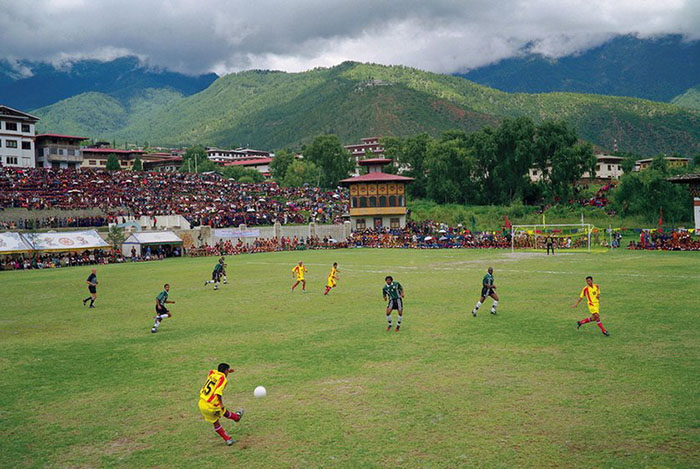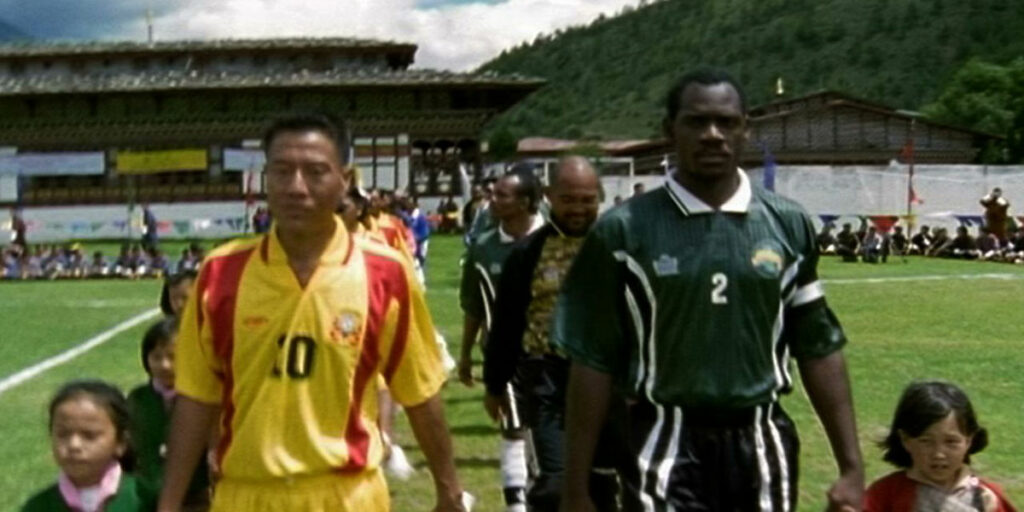The Other Final documents a unique sporting event which has to be witnessed to be believed, with a message just as resonant 20 years later.
The World Cup is the world’s premier soccer event and arguably the biggest sporting event in the world. Over one billion people watch the final alone every four years, with the number growing worldwide. While a contest of the best nations with the biggest populations and strongest teams is a spectacle, many smaller nations may feel left out. Some of them may want to travel far but cannot find the talent or finances to do so. This is what the 2002 documentary The Other Final seeks to provide. The two worst national soccer teams at the time were Bhutan and Montserrat, nowhere near each other on the map and not global powers by any means. A Dutch filmmaker decided to pair them up simply because he could, and he wanted to see what would happen, and the results are as intriguing as they are heartwarming. With this year’s thrilling final still fresh in our minds, it feels fitting to go back twenty years and look at The Other Final in context.
This event started out as a joke. In 2002, Johan Kramer, a Dutch ad executive and documentarian, lamented how the Dutch national team failed to qualify for the World Cup. On a whim, he looked up who the two worst teams were in the FIFA (Federation of International Football Associations) rankings and found Bhutan and Montserrat at the bottom, in positions #202 and #203. Kramer decided to arrange the match, using his knowledge of advertising and sponsorship from his agency KesselsKramer. His partner Matthijis de Jongh, who had visited Bhutan the year before, arranged the meeting via fax and selected the venue, with the match set to be held on the morning before the actual World Cup final. Thus, The Other Final was born.
The two countries chosen were small and remote, but for different reasons. Montserrat is an island in the West Indies, officially a territory of the United Kingdom, with a population just under 5,000. In 1995, their capital was destroyed by a volcano, and with it their only soccer pitch. In 2002, the nation was still hurting from the impact, and would take any publicity to advance awareness for their nation. Meanwhile, Bhutan is a small state in the Himalayas known for their isolationism and for being one of the last true absolute monarchies in the world. Cable television only came to the country in 1998 to promote the World Cup that year, so they had only begun to connect with the outside world. These two nations could not have been more different, and neither could have pointed to the other on the globe. It seemed to be such a strange pairing for a matchup, but Kramer made it work.

The Other Final shows the true beauty of sports in their purest form. Soccer was made to bring countries together and have nations which otherwise would not meet show their talents on the world stage. Nowadays, much of that is forgotten by the competition angle, with more focus placed on records and statistics than the camaraderie of sports. Montserrat and Bhutan face off not for bragging rights, but for the chance to have fun and travel to new places. With no sponsorship, no coaching, and a stadium with only one loudspeaker, the teams play each other like kids at recess, just soaking in the moment.
In the wrong hands, this experiment could have come across as exploitative, but Kramer approaches both nations with respect and tact. The first quarter of the movie is dedicated to exploring Montserrat, getting to know the team and its coach Paul Morris, and documenting their flight to Bhutan. The Bhutanese as the hosts are given equal respect, with team interviews and discussion of Bhutanese culture placed front and center. Special emphasis is placed on Bhutan’s team captain Wangay Dorji, whose passion for the game and charismatic personality make him the breakout star of the film. These nations have people with aspirations and dreams and a love of soccer, like in any other country. The Other Final focuses on the passion and humanity of these people, not the records of the teams or the novelty of having them play each other.
It is worth noting both teams have improved since this game. Montserrat became a regional contender in the Caribbean after CONCACAF (Confederation of North, Central American, and Caribbean Association Football) created the Nations League, winning three games in 2018 and qualifying for the second tier of the contest. That same year, Bhutan scored an upset of Sri Lanka in World Cup Qualifying, which put them in the Asian Cup for the first time in 2019. Today, Montserrat and Bhutan rank 179 and 185 respectively, a massive improvement in rankings over the last twenty years. Perhaps due to exposure and interest garnered from people watching this film, the teams got more players and more competitive opportunities.
The Other Final shows us what sports can do in the right setting and location. For every World Cup power like Brazil, there is an underdog like Bhutan, and those underdogs deserve attention too. The match itself and its outcome are not too important to anyone involved. Rather, the mere fact they were able to get together and hold the game makes everyone a winner. In the twenty years following this documentary, it is quite peculiar how nobody has tried anything like it since. After all, the bottom two teams are different now, and they deserve their own chance to play each other. Perhaps it is time to do another Other Final: this time, it would be San Marino vs. Anguilla.
The Other Final is now available to watch for free on YouTube everywhere, and on MUBI in select European countries.

